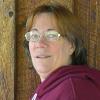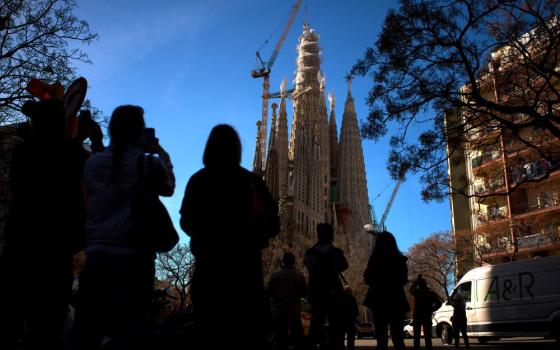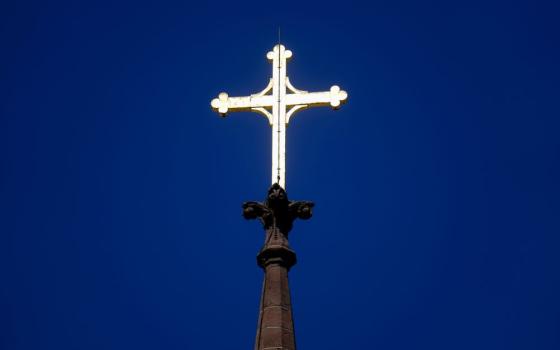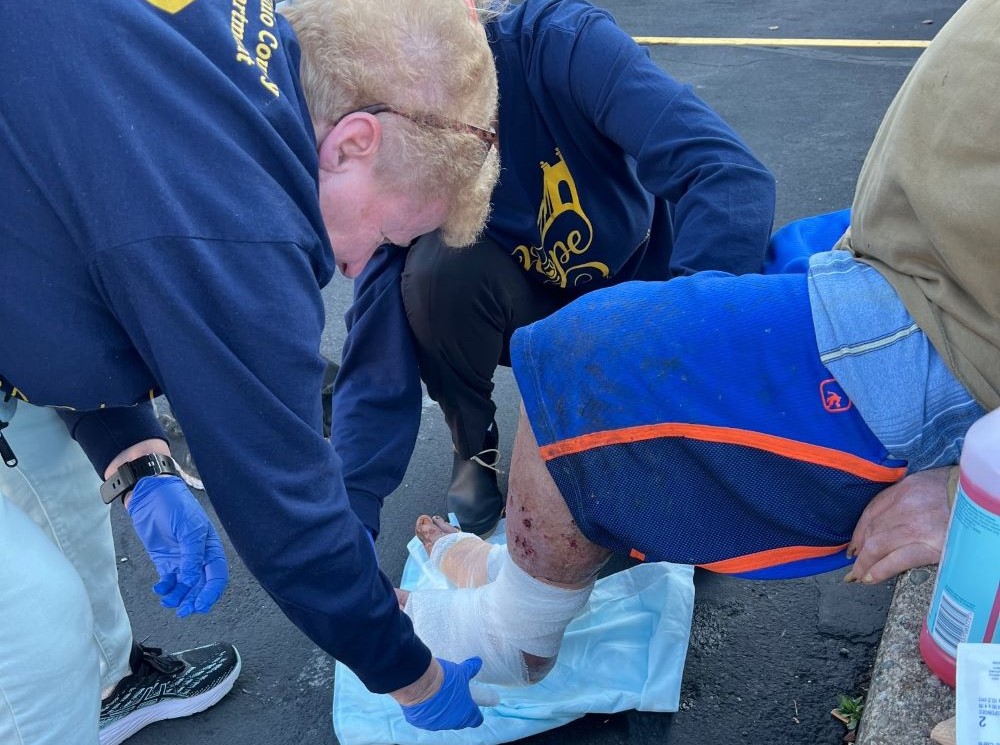
Sr. Mary Meyers bandages the foot of a patient at Project Hope in Wheeling, West Virginia. She works on Pittsburgh's Duquesne University campus during the week and volunteers on weekends, providing health care for those in need. (Courtesy of Mary Meyers)
Many vowed religious women have traveled what might be considered a winding road in their ministries over the years, and worn many hats in the process.
Sr. Mary Meyers of the Sisters of St. Joseph of Baden has a unique take on the path she's traveled: "It's quite a story, more like a Marvel comic."
Meyers may qualify as a sort of superhero — as do so many religious who have left their comfort zones in schools or hospitals to care for those in desperate need. She was born in Staten Island, New York, the oldest of three children. She attended elementary and high schools within walking distance of her home. Offered a partial scholarship to one Catholic college, a "chance encounter" in her high school counselor's office altered her journey.
A self-admitted "homebody," Meyers navigated a complicated commute across the Verrazano-Narrows Bridge — definitely out of her comfort zone — studying at St. Joseph's University of Brooklyn, where she met the Sisters of St. Joseph for the first time.
"I immediately felt at home with them," due to their honest humanity and sense of humor, Meyers recalled. While she initially resisted the idea of religious life, she entered the Sisters of St. Joseph of Brentwood after her college graduation in 1976.
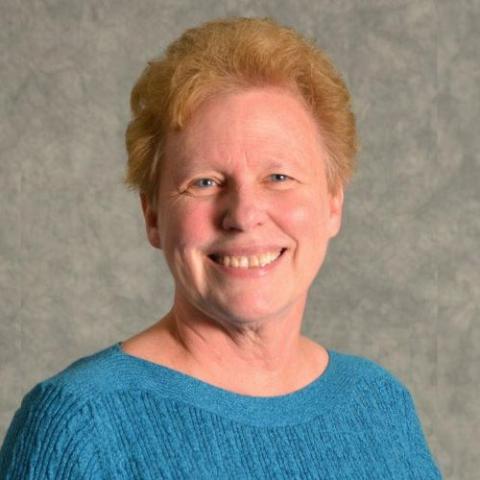
Sr. Mary Meyers (Courtesy of Mary Meyers)
Her ministries included teaching elementary and high school until 1991, when she reconnected with a Sister of St. Joseph of Baden and made a retreat with her. Meyers transferred to the Baden community, working in their Girls Hope ministry, which provided housing and education for economically disadvantaged youth.
Another chance encounter brought up the subject of Meyers' medical knowledge, and raised the question of why she hadn't studied nursing. By the end of the 1990s, she had earned a bachelor's degree in nursing from Pittsburgh's Duquesne University, and began working as an intensive care unit nurse.
More ministerial changes were on the horizon for Meyers. Hired as an adjunct clinical instructor at Duquesne's nursing school, the dean of the program — discovering Meyers held a master's of education degree coupled with nearly two decades of teaching experience — asked her to take on the task of tutoring seniors who struggled with testing.
That wasn't the end of Meyers' journey, though. She returned to the classroom as a student herself, earning a master's degree in nursing from St. Louis University, and a doctorate of nursing practice.
Her clinical work during those studies took her to the Ohio Valley Health Center, a free clinic in Steubenville, Ohio, where she served the uninsured or underinsured. She also started working with a program called Project HOPE in Wheeling, West Virginia, that serves unsheltered individuals.
Advertisement
While she currently works on the Duquesne campus during the week, Meyers continues to travel on weekends, volunteering to provide health care for those in need — an essential service in an era where public funds for Medicaid and Medicare have been drastically scaled back.
This year, Meyers was honored by the Ohio Valley Health Center as Medical Provider of the Year.
Global Sisters Report: What draws you to continue your work providing health care to those in need at the Ohio Valley Health Center and Project HOPE, in addition to your academic work?
Meyers: I am part of a team of selfless doctors, nurses and advance practice nurses and honestly, I love it. Both of these places give me the purest form of medical care I have ever known. We do not bill, we simply serve those who, for a variety of reasons, have not had much luck in life.
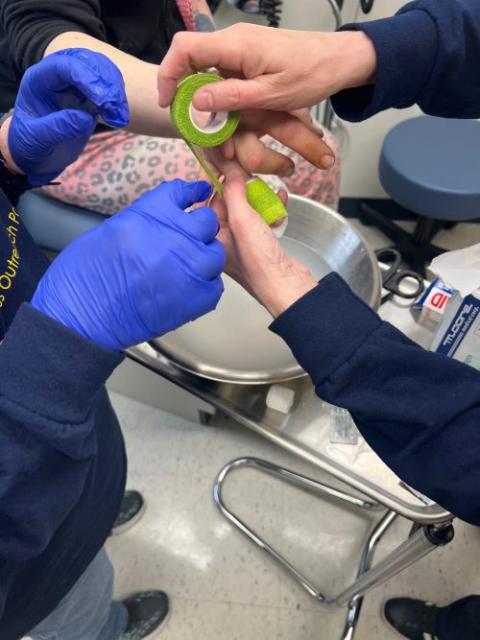
Sr. Mary Meyers takes care of a person's injured finger at the clinic at the Catholic Charities Neighborhood Center in Wheeling, West Virginia. (Courtesy of Mary Meyers)
I often compare the work with the unsheltered as a modern day MASH unit. We patch them up as best we can and we work to get them housing, drug/alcohol treatment, mental health help and whatever they need, and we send them back into the battle for survival. When one of them makes it, I cannot describe how happy that makes us.
What challenges do you find the patients facing (such as government cutbacks to Medicare/Medicaid)?
The biggest hurdles for the folks who are unsheltered is treatment for drugs and mental health. So far, the cuts have not adversely affected them, but we all know it's coming. And then, the president of the United States talking about institutionalizing persons who are addicted, mentally ill and homeless is both terrifying and triggering for them. If they have a felony conviction, they are not allowed to get government subsidized housing. It seems like even when they have paid their debt to society, they continue to be punished. This is a huge drawback as we work to get them housed. Everything in society works against them, and we try to give them some love and help in a world that vilifies them.
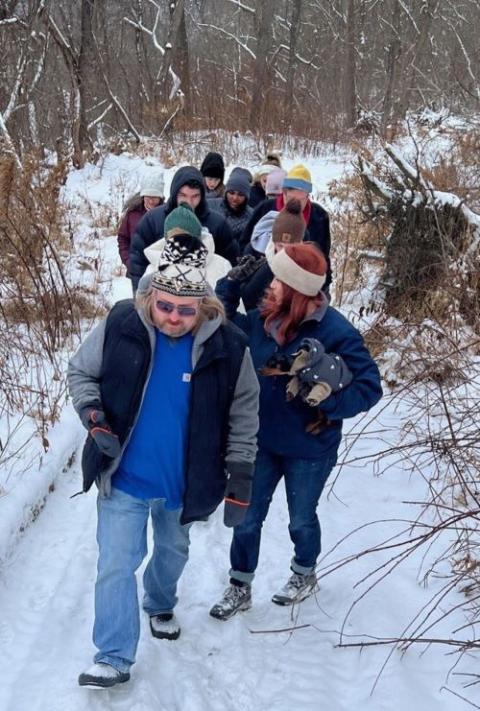
Even in snowy conditions, the Project Hope team ventures out looking for people who need help. The program in Wheeling, West Virginia, serves unsheltered individuals. (Courtesy of Mary Meyers)
What challenges do you face when it comes to providing health care to those in need?
Honestly, I love the work. My biggest challenge is my energy level at times! So far, it has not hindered me but, at 71, working a full-time job and weekend work on top of that is exhausting. But, I am a pretty high-energy person so I will use my gifts for as long as I can. I can also imagine, when I retire from full-time ministry, I will still be able to volunteer in both of these places. I waited a long time to become a nurse, and then a nurse practitioner. I will use it for the people of God for as long as I can.
How do you see the future of health care for the poor, like those you currently serve?
I have never been more terrified about the future of the poor as I have been since last November. This administration has a cruelty toward the poor I would never have believed possible. Even something as simple as vaccines is now in deep jeopardy in this current madness.
I recently had a patient who came into the clinic and had a severe strep infection. He had a high fever and he had so much swelling in his throat that I was concerned he had a peritonsillar abscess. This was something that needed to be drained in an ER setting. I knew he could not swallow the antibiotics he needed. He was there with his wife and 5-year-old daughter. They did not speak a word of English. I uploaded Google translate on my phone to talk with them. They were undocumented, and I was worried they would go to the hospital and be detained by ICE. Ultimately, we sent him to the Catholic hospital in Steubenville, and I was assured they would be safe there.
These are things I would never have believed possible a couple of years ago. Health care in this country is fractured, insurance is impossible for many low-income people, and now we have an administration who is trying to destroy it from within. God help us!
